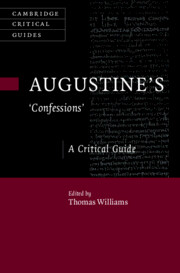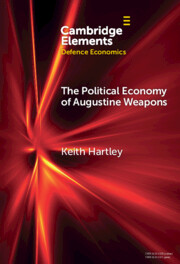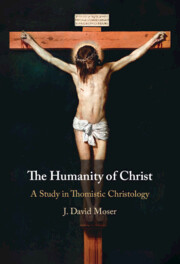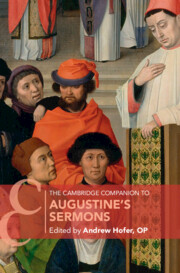Refine search
Actions for selected content:
174 results
Chapter 1 - Introduction
-
- Book:
- Family, Vocation, and Humanism in the Italian Renaissance
- Published online:
- 18 December 2025
- Print publication:
- 29 January 2026, pp 1-17
-
- Chapter
- Export citation

Augustine's ‘Confessions'
- A Critical Guide
-
- Published online:
- 16 December 2025
- Print publication:
- 22 January 2026
What Theological Commitments Structure Loving Attention to Moses’s Law?
-
- Journal:
- New Blackfriars ,
- Published online by Cambridge University Press:
- 24 November 2025, pp. 1-18
-
- Article
-
- You have access
- Open access
- HTML
- Export citation

The Origins of Scholasticism
- Theology and Philosophy in Paris, 1150–1250
-
- Published online:
- 18 November 2025
- Print publication:
- 08 January 2026

The Political Economy of Augustine Weapons
-
- Published online:
- 30 October 2025
- Print publication:
- 27 November 2025
-
- Element
- Export citation
Introduction
-
- Book:
- The Will in English Renaissance Drama
- Published online:
- 04 September 2025
- Print publication:
- 18 September 2025, pp 1-31
-
- Chapter
- Export citation
Chapter I - Introduction
-
- Book:
- Kant and the Supposed Right to Lie
- Published online:
- 18 July 2025
- Print publication:
- 28 August 2025, pp 1-13
-
- Chapter
- Export citation

The Humanity of Christ as Instrument of Salvation
- A Study in Thomistic Christology
-
- Published online:
- 21 August 2025
- Print publication:
- 04 September 2025
Chapter 2 - Petitions
-
- Book:
- Performing Justice in the Later Roman Empire
- Published online:
- 07 August 2025
- Print publication:
- 21 August 2025, pp 26-50
-
- Chapter
- Export citation
Chapter 1 - Being and Time as a Whole: From Pragmatism, to Existentialism, to a Philosophy of Being, via the Good
-
-
- Book:
- Heidegger's <i>Being and Time</i>
- Published online:
- 28 June 2025
- Print publication:
- 26 June 2025, pp 7-30
-
- Chapter
- Export citation
The Conversion of Grief in the Confessions
-
- Journal:
- New Blackfriars / Volume 106 / Issue 5 / September 2025
- Published online by Cambridge University Press:
- 18 June 2025, pp. 428-438
- Print publication:
- September 2025
-
- Article
- Export citation
3 - Transmission and Collections of Augustine’s Sermons
- from Part I - Augustine’s Pastoral Task of Preaching Sermons
-
-
- Book:
- The Cambridge Companion to Augustine's Sermons
- Published online:
- 26 May 2025
- Print publication:
- 12 June 2025, pp 60-78
-
- Chapter
- Export citation
Introduction
-
-
- Book:
- The Cambridge Companion to Augustine's Sermons
- Published online:
- 26 May 2025
- Print publication:
- 12 June 2025, pp 1-22
-
- Chapter
-
- You have access
- HTML
- Export citation
1 - Augustine as Preacher and His Brethren in the Church
- from Part I - Augustine’s Pastoral Task of Preaching Sermons
-
-
- Book:
- The Cambridge Companion to Augustine's Sermons
- Published online:
- 26 May 2025
- Print publication:
- 12 June 2025, pp 25-43
-
- Chapter
- Export citation

The Cambridge Companion to Augustine's Sermons
-
- Published online:
- 26 May 2025
- Print publication:
- 12 June 2025
On the Ethics of Lying
-
- Journal:
- New Blackfriars / Volume 106 / Issue 5 / September 2025
- Published online by Cambridge University Press:
- 22 May 2025, pp. 373-397
- Print publication:
- September 2025
-
- Article
-
- You have access
- Open access
- HTML
- Export citation
Introduction:
-
-
- Book:
- Medieval Philosophical Writings on the Powers of the Soul
- Published online:
- 10 April 2025
- Print publication:
- 17 April 2025, pp 1-40
-
- Chapter
- Export citation
1. - Bonaventure (d. 1274), Commentary on the Sentences, book II, d. 24, a. 2, q. 1:
-
- Book:
- Medieval Philosophical Writings on the Powers of the Soul
- Published online:
- 10 April 2025
- Print publication:
- 17 April 2025, pp 41-55
-
- Chapter
- Export citation
1 - Augustinianisms and Liberalisms
-
- Book:
- Political Theology and the Conflicts of Democracy
- Published online:
- 21 March 2025
- Print publication:
- 03 April 2025, pp 35-94
-
- Chapter
- Export citation
Introduction
-
- Book:
- Political Theology and the Conflicts of Democracy
- Published online:
- 21 March 2025
- Print publication:
- 03 April 2025, pp 1-34
-
- Chapter
-
- You have access
- HTML
- Export citation
